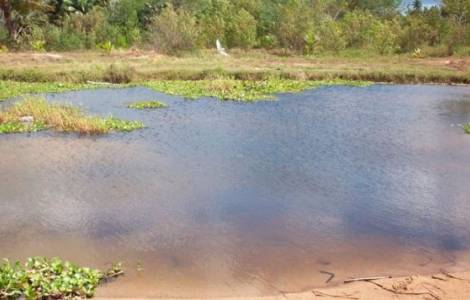
San Salvador (Agenzia Fides) - "The reality of water in our country is worrying", highlighted the Bishops of El Salvador in a statement entitled "Water is a precious resource that we must all protect". In the country there are 590 rivers, of which 70% are contaminated and their waters cannot be used for human or animal consumption.
Despite the recommendation, the main irrigation systems use them for crops and subsequent consumption of fruit and vegetables. The sources that generate pollution in rivers are companies of various kinds, which discharge their wastewater into rivers, municipalities that do not have systems to treat wastewater, monocultures such as sugar cane, the lack of sanitation.
The statement from the Episcopal Conference still reminds us that the rivers that flow in El Salvador originate in Honduras and Guatemala, and that there are about 42 mining projects that directly threaten the transboundary basins, which will pollute the waters of the waterways. The most serious case is the Cerro Blanco mining project, located in Asunción Mita, department of Jutiapa, Guatemala, 14 kilometers from El Salvador, in an important underground aquifer between the Ostúa River and the municipality of Metapán, El Savior. The Ostúa River will pollute Lake Güija, due to the quantities of natural arsenic it will receive from the Cerro Blanco mine activity, and Lake Güija will pollute the Lempa River, as it is its largest water supplier. "This situation constitutes a great threat to El Salvador, which must be addressed urgently and with the utmost concern - denounce the Bishops -. We make a vehement appeal to the authorities of our country to take all possible measures to stop this project; and, we ask the international community, not to allow such a human and environmental disaster; at the same time, we urge all Salvadorans to demonstrate against this attack on our Country, against the life and health of people, against the fauna and flora".
The statement recalls that in El Salvador there are about 2,500 water bodies and various community committees ("Las Juntas de Agua") that carry out "an important social and environmental function", as they supply more than half a million families, especially in the rural area of the country, reaching places where the State does not reach. So "these are community systems, not private companies", however in the "General Law of Water Resources" approved by the ad hoc Commission composed of the deputies of the Legislative Assembly, they are considered "as private companies". The Bishops therefore ask that "they have the opportunity to present their considerations or observations to the approved Law". Furthermore, for the good of all, they ask that the Legislative Assembly ratify the constitutional reforms on the human right to water and adequate food, already approved (see Fides, 24/2/2021; 15/6/2021).
"In the name of the people, today we raise our voices to ask for this ratification", the Bishops conclude, inviting everyone to pray, to ask God "not to allow this imminent huge catastrophe with very serious and irreparable consequences on the life and health of people, animals and plants". (SL) (Agenzia Fides, 1/12/2021)
OCEANIA/AUSTRALIA - Appeal of 'Catholic Mission': “No” to destructive violence and hatred in society